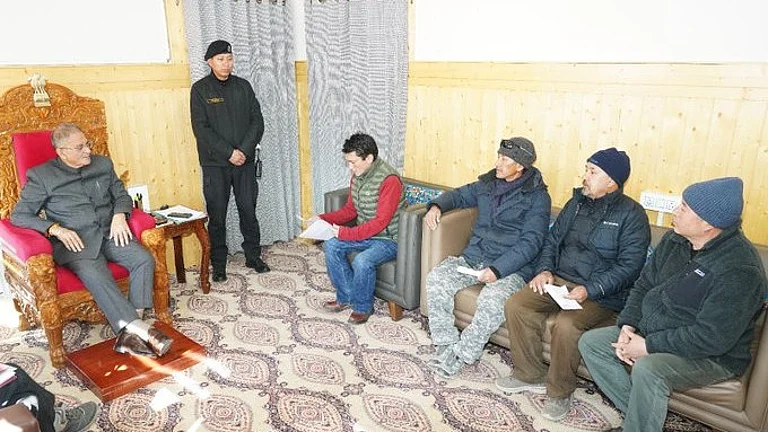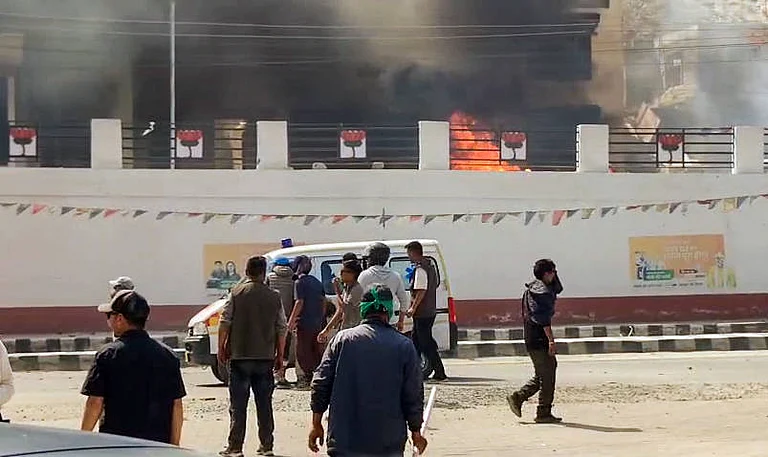After the Union Ministry of Home Affairs announced the creation of five new districts in the Union Territory of Ladakh on Monday, local leaders are hopeful that these districts will come with increased autonomy. They say if the new districts--three in Leh and two in Kargil-bringing the total to seven--do not include provisions for self-governance, their struggle for autonomous districts will continue.
“I thank both the Union Home Minister Amit Shah and Prime Minister Modi for announcing five districts for Ladakh. It was an old demand especially of the Zanskar region. In 2019, the government had promised people of Zanskar that they would be given district status,” said Ladakhi innovator Sonam Wangchuk, who earlier this year launched a 21-day fast asking for the Ladakh region to be included in the Sixth Schedule of the Constitution, which enables the creation of councils with some legislative powers.
Wangchuk added that it has to be seen whether the new districts are administrative districts or democratic districts having autonomous district councils.
“In 2019, the government had promised to take Ladakh under the Sixth Schedule and if under that scheme these new districts will have autonomous district councils then it is a good thing. But if they are only administrative districts then I must reiterate that development is not only a demand of people of Ladakh but democracy is also,” Wangchuk said.
He said in 2019, when Ladakh was given Union Territory status along with the abrogation of Article 370, the move was welcomed in the region. “They had hoped that Ladakh would be UT with an Assembly. But when people realised that Ladakh is UT without a legislature, people demanded statehood. In the same manner, they are demanding Sixth Schedule.” He hoped the new districts would have democracy with decisions taken by elected representatives. “If not, then our struggle will continue,” he added.
Sajjad Kargili, a leader of Kargil Democratic Alliance, an amalgam of different political and religious groups, said, “We welcome the decision taken by the government but the fundamental demand of the people of Ladakh is the restoration of democracy in terms of statehood and Sixth Schedule.” “Until democracy is restored, the creation of new districts in Ladakh is merely the addition of another administrative layer. The voices of the people must be respected,” he added.
The Home Ministry has directed the Ladakh UT administration to form a committee to review the new districts' boundaries, headquarters, and administrative structure. The committee will report in three months.
The new districts are Sham, Nubra, and Changthang in Leh, and Zanskar and Drass in Kargil. Before the announcement Ladakh had only two districts--Leh and Kargil.
The decision was largely welcomed. However, the Leh Apex Body (LAB), another umbrella organisation of different political and religious groups and Kargil Democratic Alliance (KDA) say they will continue with their planned protests, including a month-long padayatra to New Delhi starting on September 1.
The LAB was created in 2020 after the abrogation of Article 370 and the bifurcation of J&K into two Union Territories. The organisation was formed to fight for the Sixth Schedule for Ladakh. The LAB is currently headed by Thupstan Chhewang, a well-respected leader in the Ladakh region who has been a Parliament member from Ladakh twice. He resigned from the Parliament and the BJP in 2018 and since then has devoted himself to the fight for the Sixth Schedule for Ladakh. Similarly, in Kargil, political parties formed KDA in 2020, and began their agitation seeking reunification with Jammu and Kashmir, calling the abrogation of Article 370 unconstitutional. The existing districts of Leh and Kargil have Autonomous Hill Development Councils.
The Ladakh Autonomous Hill Development Council (LAHDC) in Leh was established under the Ladakh Autonomous Hill Development Council Act of 1995, during the tenure of the PV Narasimha Rao government. Its first election took place in 1995. Later, during the administration of the People's Democratic Party led by Mufti Mohammad Sayeed in 2003, a similar council was constituted for the Kargil district.
It’s uncertain whether the new districts will get similar councils or if one Regional Council will cover all seven districts. This will be clarified once the new districts are officially established.


























